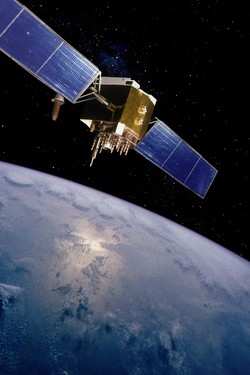Sun, Sep 16, 2007
 Boeing has successfully assembled
and integrated all flight hardware onto the first Global
Positioning System (GPS) IIF satellite. GPS llF will bring new
capabilities to the GPS constellation such as full onboard
encrypted military code, a new civil signal, crosslink
enhancements, signal power increases and longer design life.
Boeing has successfully assembled
and integrated all flight hardware onto the first Global
Positioning System (GPS) IIF satellite. GPS llF will bring new
capabilities to the GPS constellation such as full onboard
encrypted military code, a new civil signal, crosslink
enhancements, signal power increases and longer design life.
"GPS IIF is on track because of the team's stellar application
of back-to-basics program management," said Howard Chambers, vice
president and general manager of Boeing Space and Intelligence
Systems. "The performance of these subsystems is a testament to our
process-based management and to our lean manufacturing commitment,
and GPS IIF fully meets the specifications set forth by our U.S.
Air Force customer and places us firmly on track to deliver the
satellite for the first launch in 2008."
Boeing is building 12 GPS Block IIF satellites under contract
from the Navstar GPS Wing at the Space and Missile Systems Center
in Los Angeles.
The satellite's sophisticated L-band payload will include new
hardware that serves the civil user community. Designed to enhance
non-safety-critical applications, the signals will improve aviation
and other precision safety signals.
Technicians are preparing GPS IIF for key dynamic environmental
tests designed to confirm its structural design and mechanical
integrity. They also are attaching the solar panels and configuring
the satellite before it undergoes several physical tests. The tests
will help ensure robust mission assurance with an emphasis on
product integrity and mission success.
Each GPS IIF satellite will complete acoustic stress tests using
high-powered speakers to verify that the spacecraft can tolerate
the high sound pressure levels during launches; mechanical tests
similar to a separation test to make sure it disconnects cleanly
and correctly from the launch vehicle; tests of its deployable
mechanisms such as the solar wings and the antenna to ensure that
they release correctly on-orbit; and finally, GPS IIF will undergo
thermal vacuum testing to confirm its ability to operate in a
vacuum and under the extreme temperatures of space.
More News
Takeoff Roll The process whereby an aircraft is aligned with the runway centerline and the aircraft is moving with the intent to take off. For helicopters, this pertains to the act>[...]
“We’re proud of the hard work that went into receiving this validation, and it will be a welcome relief to our customers in the European Union. We couldn’t be mor>[...]
"Aircraft Spruce is pleased to announce the acquisition of the parts distribution operations of Wag-Aero. Wag-Aero was founded in the 1960’s by Dick and Bobbie Wagner in the >[...]
IDENT Feature The special feature in the Air Traffic Control Radar Beacon System (ATCRBS) equipment. It is used to immediately distinguish one displayed beacon target from other be>[...]
Aero Linx: Pararescue Air Force Pararescuemen, also known as PJs, are the only DoD elite combat forces specifically organized, trained, equipped, and postured to conduct full spect>[...]
 ANN's Daily Aero-Term (05.10.24): Takeoff Roll
ANN's Daily Aero-Term (05.10.24): Takeoff Roll Aero-News: Quote of the Day (05.10.24)
Aero-News: Quote of the Day (05.10.24) Aero-News: Quote of the Day (05.11.24)
Aero-News: Quote of the Day (05.11.24) ANN's Daily Aero-Term (05.11.24): IDENT Feature
ANN's Daily Aero-Term (05.11.24): IDENT Feature ANN's Daily Aero-Linx (05.11.24)
ANN's Daily Aero-Linx (05.11.24)



